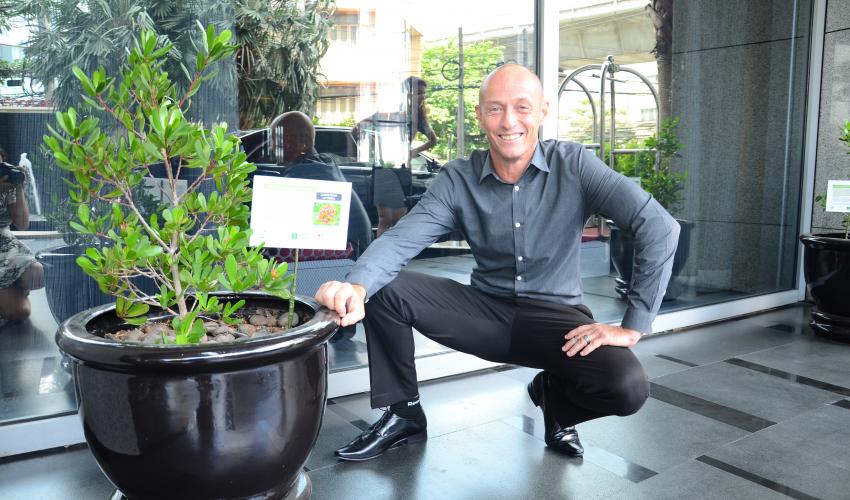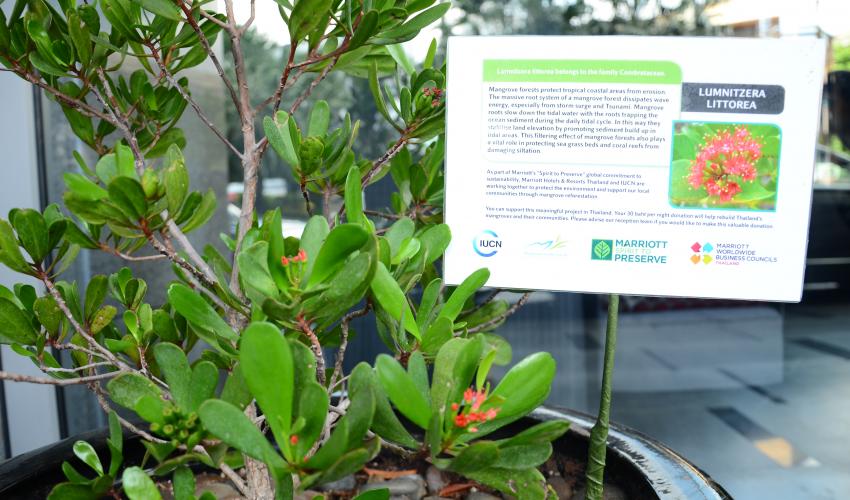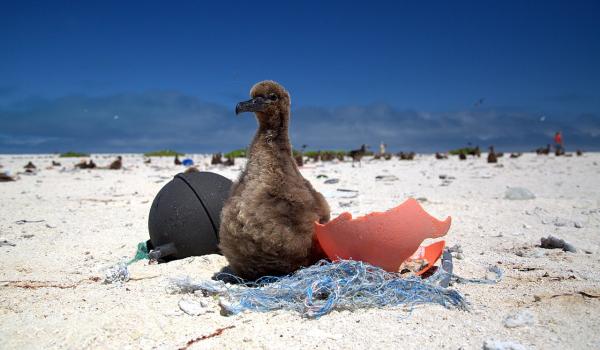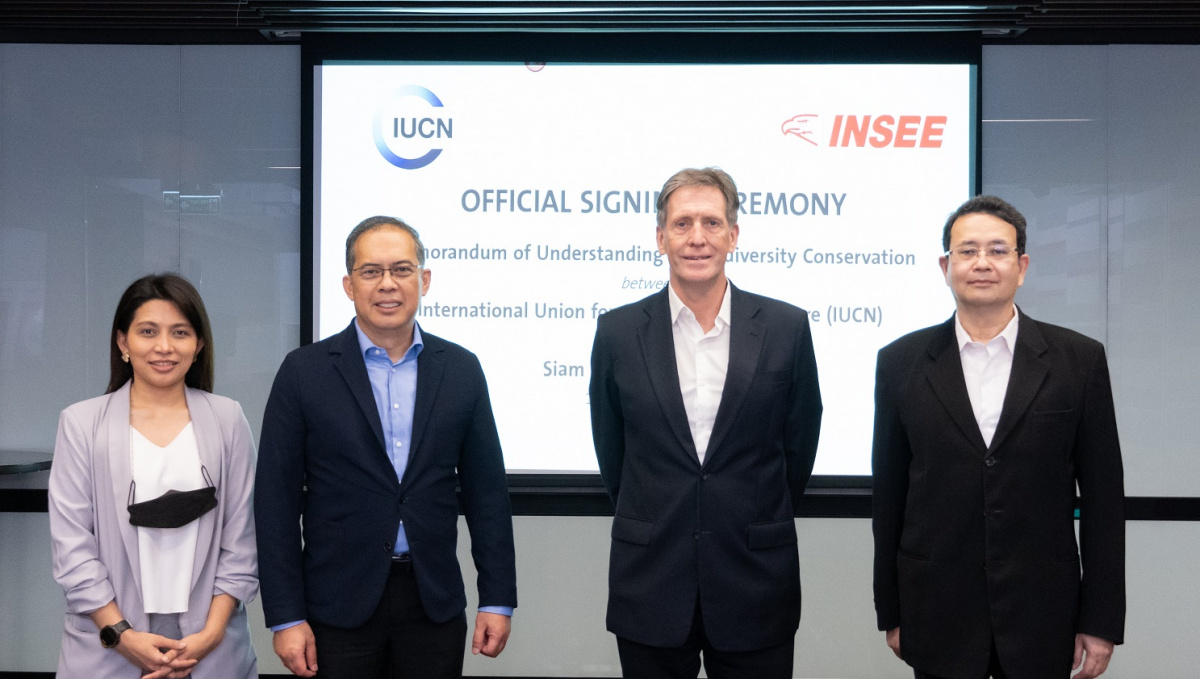Marriott and MFF: The power of private sector partnership
Through Mangroves for the Future (MFF), IUCN established a partnership with Marriott Hotels & Resorts to protect the environment and support Thailand’s local communities through mangrove restoration, the use of sustainable seafood sources and local procurement practices. Among other achievements, the collaboration has since restored an area of approximately 26 rai by planting 20,000 trees in four strategic mangrove restoration sites in Thailand in collaboration with local communities and the Department of Marine and Coastal Resources (DMCR), as well as invested 2,972 volunteer hours by Marriott associates and guests.

Photo: © IUCN Asia/ Shreeya Joshi
In the second of a series of stories celebrating and honoring the people and initiatives that have been instrumental in contributing to coastal conservation, we spoke with private sector conservation champion Mr.Sean Panton, Co-Chairman and Director of Corporate Social Responsibility of Marriott Thailand Business Council.
Sean represents Marriott Thailand’s Business Council in matters concerning corporate social responsibility, and is the CEO and Founder of SEEK Phuket, a Civil Society Organisation that works with the local community, the local Phuket government, the private sector and residents of Phuket to communicate and lobby to keep Phuket a leading sustainable destination for the future.
1) What does the environment mean to Marriott and why is Marriott so concerned about it?
Wherever Marriott builds a resort property we have to seriously consider its impact on the environment. One of Thailand’s biggest coastal environmental problems is mangrove loss and degradation. This is a major problem for Marriott because a lot of our hotels are located in coastal areas. The JW Marriott Phuket, for example, sits on the edge of a turtle nesting ground. Because of our hotel locations, we are very aware of the local environment and the need to conserve it while supporting the local community.
Out of 790 hotels in Phuket, only around 20 of them are operating in an environmentally conscious way. As you can see, there is so much potential on the island for effective conservation projects. We saw the need to take the lead in strategically addressing these gaps in conservation efforts and while doing so work together with other private sector entities to incorporate environmental considerations into their business operations.
2) Why did Marriott decide to partner with MFF?
Marriott wanted to partner with an organisation that actively practiced environmental stewardship. After learning that MFF’s objectives were in line with Marriott’s sustainability goals, we were very keen on partnering with the programme through IUCN. Both our organizations are present on the ground in many of the areas that are really important for us. We also have a shared concern about the well being of local communities, the sustainability of the local environment, and an understanding that these two things have to go hand in hand. We wanted to set forth a vision for environmental stewardship that is multi-faceted, one that combine a variety of community engagement tools. We knew that together with IUCN’s technical expertise and credibility as a trusted partner, we could be a very strong force for positive change.
Before we proceeded, we undertook the due diligence process together with IUCN. We wanted to access the risks and opportunities of the engagement as thoroughly as possible before inking the deal.
 Photo: © IUCN Asia/ Shreeya Joshi
Photo: © IUCN Asia/ Shreeya Joshi
3) What has Marriott accomplished in terms of CSR?
Marriott believes that it must conduct matters as a responsible business. As Mr Marriott himself says, “It is not the business we do, it is how we do business that matters.” This is why Marriott is involved in an extensive range of CSR activities, particularly engaging in key environmental and social issues.
Marriott Thailand is the first business council in the world to strategically align itself with Marriott’s Core CSR values as far as having a dedicated Director of CSR to work together with the GMS team and develop the national programs. S E R V E- Shelter and food, Environment (IUCN), Readiness for jobs, Vitality of children, and Empowerment of diversity. For every SERVE component, we have worked with relevant organizations and people. For example, for the ‘Environment’ component, we work with IUCN. For ‘Vitality for Children’, we work with Save Our Children and Operation Smile, and for ‘Empowerment of diversity’ we work with MFF to help us source suppliers of sustainable seafood and food from small scale farmers.
We strive to maintain a healthy environment for our guests and a “happy community” within our business networks. Our hotels act as social economic drivers. The wellbeing of local communities is very important to us so we try our best to engage them as much as possible. We employ these communities, provide vocational training for them, purchase items from them, and encourage our guests to frequent and make purchases at businesses operated and owned by them.
4) What do you hope to achieve out of this collaboration with MFF?
In the past we tried to achieve our national conservation goals on our own, but now with our collaboration with MFF, these efforts are more strategic and impactful.
Collaborating with conservation entities such has IUCN will help us to understand how to ensure that the benifits of biodiversity can be enjoyed by future generations. I have full trust in IUCN as they have over 60 years of experience in the field and have demonstrated that by working with the government and having strong partnerships with civil society organisations, it is possible to conserve our most precious natural resources.
MFF has educated our associates, guests and management teams on the importance of conservation programmes and the positive impact they have on the environment and community. By doing so, MFF has certainly bought a new level of understanding and increased consciousness to our network. We are very thankful for this.
5) Do you think the private sector plays an important role in conservation?
The public sector has long been a major provider of conservation services through national parks etc. whereas private sector conservation activities have been less apparent. I think that valuable contribution by both sectors is critical in ensuring that appropriate outcomes can be achieved and that the benefits of biodiversity can be enjoyed by future generations.
So yes, I do think that the private sector needs to play a more significant role in advancing the conservation agenda. Unfortunately, very often, the private sector makes its money by polluting and over-utilising the environment. Like I mentioned earlier, in Phuket, only about 20 out of 790 hotels are operating in an environmentally conscious way. This is not a very good sign.
Phuket is a perfect example of a place with overcrowded beaches and increasing amount of pollution. Maintaining good environmental standards and practices is not always being enforced so it is up to hotels and other private sector entities to do something.
I think it is necessary for the private sector to work really closely with NGOs and intergovernmental organizations. Hotels in Phuket should be aware of their environmental footprint and align themselves with organizations that engage in conservation work. It is within their own best interests long term to maintain a healthy environment.
Having said that, such cooperation needs to be demand driven. Apart from environmental drivers, there needs to be a business case for mutual cooperation.
Future projects will continue to explore partnerships with other organisations to achieve maximum impact. The Mai Khao Marine Turtle Foundation established by the Turtle Shelter and Education Center, an IUCN Member Organization, is a perfect example of how private sector joint programmes can help support conservation. The Phuket Marine Biological Center facility is housed at the JW Marriott Phuket Resort and Spa and managed by the Main Khao Marine Turtle Foundation with the support of IUCN. The centre is supported by the Prince of Songkle University, the Royal Thai Navy, the Department of National Parks, the Department of Fisheries, local civil society organization SEEK Phuket and funded by Marriott, MVCI, Anantara and the Minor Group. This is a cutting edge strategic partnership that showcases the future of conservation.
 Photo: © IUCN Asia/ Shreeya Joshi
Photo: © IUCN Asia/ Shreeya Joshi
6) Do you think the private sector can play a key role in influencing government policy?
Personally, I do think that the private sector can play a key role in influencing policy as the private sector can certainly influence change due to its influence in smaller locations such as islands. However it has to be managed very carefully. In most cases we try and stay away from government policy as it is not our mandate. However we do support worthwhile initiatives that may affect policy.
7) Can you give us an example?
I can share with you what SEEK Phuket did.
SEEK Phuket is a civil society organisation which aims to work with the local community, the local Phuket government, the private sector and residents of Phuket to communicate and lobby to keep Phuket a leading sustainable destination for the future.
SEEK has collaborated with other civil society organizations, the private sector, government, and the education sector. Amongst other activities, SEEK has conducted “Compass of Sustainability” workshops. These workshops were instrumental in understanding everyone’s concerns for the island. With the information that we acquired from the workshops as well as numerous stakeholder meetings held over two and a half years, we managed to establish an indicator report with over 32 indicators.
This report was then handed over to the Phuket Governor Khun Maitree Intrasut who at that time was very supportive. The provincial government then worked to follow the indicators very thoroughly. They cleared the beaches, took away the encroached beaches, built underpasses, fixed the flooding problems, stopped the local taxi mafia etc. They did everything according to plan. It’s been five years and Phuket is now much better than it was before. The local provincial government has been very effective in engaging and implementing this plan together with the Phuket community members and should be praised for their efforts in working with different sectors and stakeholders.
The whole project was supported and funded by the private sector partners who wanted to see this plan developed by the greater Phuket community come to fruition to improve the future of Phuket for everyone.
Another perfect example of private sector and NGO influencing the government is with the recent Turtle Declaration in Mai Khao. 10 hotels joined hands under the leadership of the Department of Marine and Coastal Resources and the Mai Khao Marine Turtle Foundation to sign a declaration of best practice to further protect the beaches for the turtles of Mai Khao.
Together the hotels, government and NGO developed 10 key implementations to further the conservation practices and improve marine sustainability at this important location.
8) Through SEEK, do you think you would be able to interest private sector entities to become involved in MFF?
The great thing about SEEK is that it is run by community members who come from both the public and private sector. This makes it possible for SEEK to engage private sector entities in becoming involved with MFF. MFF is the most appropriate multi-faceted, integrated engagement platform for the private sector to engage with, in terms of developing programmes and relationships with NGOs and government organizations aiming to advance the conservation agenda. I believe in the programme so I often try to recommend it to private sector entities. All of us can work together for a better future for the environment and the community.
9) What is the appeal of programmes like MFF to private sector entities such as Marriott?
The partnership with MFF in Thailand saves us time, increases our efficiency and focuses our efforts. MFF is a multi-dimensional stakeholder platform involving NGOs, the government, and local communities. It is a wonderful regional platform which allows us to engage with everybody at the same time and on the same frequency. And this is important for us because we have hotels all over the region.
Our guests appreciate that we partner with environmental organizations. They also do not think that we are engaging in green washing. Our commitment to our CSR values - S E R V E- has resulted in many programmes and initiatives that have contributed to the well-being of people and the conservation of nature.
At first, when I made a proposal to my associates to partner with MFF, people asked, “Who cares about mangroves?” But after two and a half years of educating our guests and showing the value of coastal ecosystems to associates, everyone is really happy. The mangrove plantings also serve as an important team-building event for hotel associates. Our employees love these activities. It builds loyalty and job satisfaction. It is also good for business. Increasingly, our customers want to know about what we are doing in this arena.
Associates love the fact that we spend time and resources to go into local communities and try to get money and support to the people on behalf of Marriott, MFF gives us the actual mechanism to be very effective in this area.
We are proud of our global sustainability report. Some would even consider this a benchmark for hospitality industry. We in Thailand are very proud as this is the first time Marriott Thailand’s mangrove project has been included in the global sustainability report.
10) Where does the future lie for the Marriott-MFF partnership?
I think a long-term strategic and measurable action plan needs to be put in place, with goals and objectives for the next 5 years.
We are learning more and actually having an impact, our teams are excited about the mangrove projects and the spin offs from it with regards to exciting new angles and ideas.
We have developed a great reputation for this project now and are excited about what the future holds as we expand and grow in the region.
Next, we would like to be part of an MFF project in Bali. I have spoken to IUCN about this plan and my team has already taken the first step, which is to develop a business council for Bali. If Marriott and IUCN were to work together in Bali that would really be great!
11) What do you expect more out of MFF?
Since Marriott operates within coastal ecosystems, we wish to continue to engage with MFF and learn more about the science behind mangroves as well as project related communications. We would like to be kept informed about what else the programme and its partners are doing so that we can share this information with our network and inspire others.
Marriott’s global sustainability report can be found here.
Mangroves for the Future (MFF) is a unique partner-led initiative to promote investment in coastal ecosystem conservation for sustainable development. Co-chaired by IUCN and UNDP, MFF provides a platform for collaboration among the many different agencies, sectors and countries which are addressing challenges to coastal ecosystem and livelihood issues to work towards a common goal across the region.



